Downpipes
( number of products: 1495 )A downpipe is a crucial part of the exhaust system. With us, you can choose the right one and receive it in as little as 24 hours!
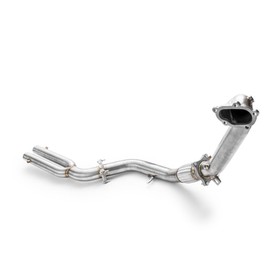
Downpipe Audi A6 C7 3.0 TDI set
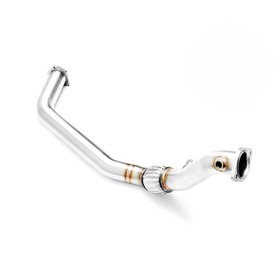
Downpipe BMW E46 318d 320d M47 M47N 1998-2005 116-150 HP
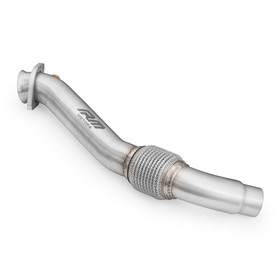
Downpipe BMW E46 330d/330dx M57 M57N 1998-2005 63.5 mm
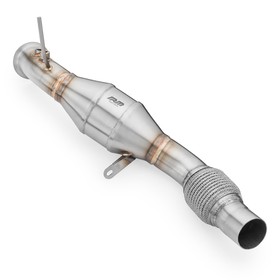
Downpipe BMW E81 E87 E82 E88 116d 118d 120d 123d N47 with muffler

Downpipe BMW E87 118d 120d M47N2 63.5 mm
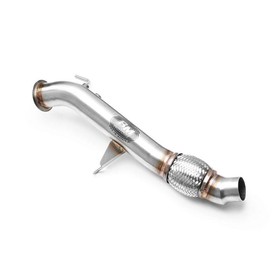
Downpipe BMW E87 118d 120d M47N2 outlet 55 mm
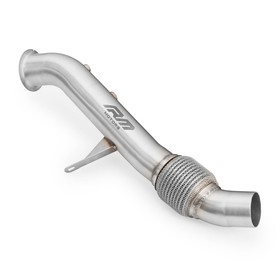
Downpipe BMW E87 118d 120d M47N2 outlet 61 mm

Downpipe BMW E90 E91 318d 320d M47N2 2004-2007

Downpipe BMW E90 E91 E92 335ix N55

Downpipe BMW E90 E91 E92 E93 316d 318d 320d N47 2007-2013

Downpipe BMW F20 F21 114d 116d 118d/dx 120d/dx 125d N47N N47S1

Downpipe BMW F30 F31 F34 F35 335i 335ix N55 (for EURO 5 version)

Downpipe BMW F30 F31 F34 GT 335i 335ix N55 (for EURO 6 version)

Downpipe Audi A3 8L TT 8N Seat Leon I Skoda Octavia VW Golf IV 1.8T FWD Decat
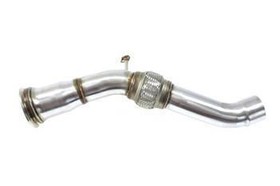
Downpipe BMW E60 E90 330d 325d 530d M57N2 Decat
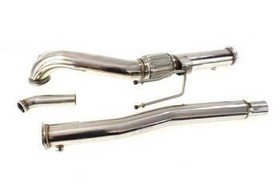
Downpipe Audi A3 VW Golf V Seat Leon 2.0T FWD

Downpipe BMW E81 E82 E87 E88 N47 116d 318d 330d 520d Decat
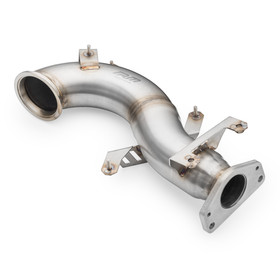
Downpipe Alfa Romeo Giulietta Multiair 1.4T

Downpipe Alfa Romeo Mito 1.4T
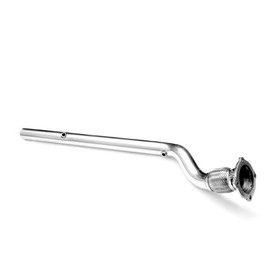
Downpipe Audi A3 8L 1.8 T 150/180 HP

Downpipe Audi A3 8L 1.8 T 1997-2003
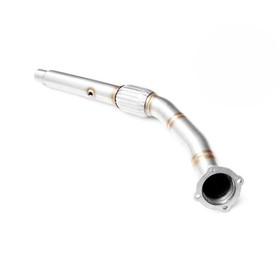
Downpipe Audi A3 8L 1.8 T 1997-2003 150/180 HP
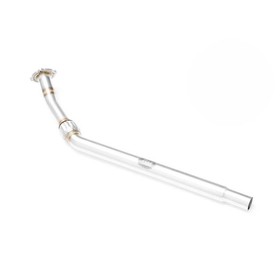
Downpipe Audi A3 8L 1.8 T Quattro 63 mm
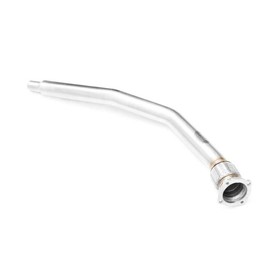
Downpipe Audi A3 8L 1.8 T Quattro 76 mm
Why Invest in a Downpipe?
A downpipe offers numerous benefits, including improving engine performance by reducing exhaust flow resistance. This, in turn, can result in increased power and torque, better throttle response, and a more satisfying exhaust sound. It is, therefore, an ideal modification for those who want to maximize their car's performance.
Is a Downpipe Legal?
Regulations regarding downpipes may vary depending on the country and region. Some places may require homologation or compliance with specific emissions standards. Before purchasing a downpipe, it's always worth checking the applicable regulations and consulting with local regulatory authorities.
What Material Options are Available for a Downpipe?
The most common materials are stainless steel and titanium. Stainless steel is popular for its durability, corrosion resistance, and relatively low cost. On the other hand, a titanium downpipe is more exclusive, known for its exceptional lightness and strength.
Does Installing a Downpipe Require Modifications to Other Exhaust System Components?
Installing a downpipe may require certain modifications, such as changing the mid-muffler or removing the catalytic converter. These modifications may be necessary to ensure optimal exhaust flow and avoid engine errors. It's always advisable to consult with a professional mechanic before proceeding with the installation.
What are the Potential Side Effects of Installing a Downpipe?
Installing a downpipe can affect exhaust noise, and some models may make the car louder than the original. Additionally, in some cases, there may be a check engine light or other diagnostic errors related to the absence of a catalytic converter. Awareness of these potential side effects is crucial, and preparation for possible consequences is advised.
Does a Downpipe Fit My Specific Car Model?
Downpipes are available in various versions and configurations to fit different car models and engines. Before purchasing, it's important to check if a particular downpipe is compatible with the make and model year of your car. The manufacturer or seller should provide information on this.
Does a Downpipe Affect Emissions?
Installing a downpipe can impact emissions, especially if it eliminates or modifies the catalytic converter. In some jurisdictions with strict emissions standards, such modifications may be illegal. Always adhere to local emissions regulations and make modifications accordingly.
Can a Downpipe be Installed DIY, or is Professional Help Needed?
Installing a downpipe can be complex, especially if it requires modifications to other exhaust system components. If you lack experience in such work, it's recommended to consult with a professional mechanic or a workshop specializing in exhaust modifications. Proper installation is crucial for optimal performance and avoiding potential issues.
What are the Long-Term Benefits of Installing a Downpipe?
Installing a downpipe can contribute to increased power and torque, improved throttle response, and better exhaust sound. Additionally, enhanced exhaust flow can positively impact overall engine performance, making driving more dynamic and satisfying for automotive enthusiasts.
Does a Downpipe Affect Engine Durability?
The installation of a downpipe itself should not have a direct impact on engine durability. However, if exhaust system modification leads to increased power, there is a potential risk of stressing other engine components. Therefore, it's important to make modifications in moderation and monitor the engine's behavior after installing a downpipe.
Is a Downpipe Compatible with a Sport Exhaust System?
A downpipe can be part of a larger sport exhaust system, which may include an exhaust manifold, mid-muffler, and rear muffler. Many companies offer downpipes as a component of a complete sport exhaust system optimized for performance and sound. Before purchasing a downpipe, it's advisable to check its compatibility with the rest of the exhaust system for consistency and optimal performance.
What are the Differences Between a Catalytic Converter and Non-Catalytic Converter Downpipe?
A catalytic converter downpipe includes an integrated catalytic converter that reduces the emission of harmful substances. This is crucial from the perspective of emissions regulations and environmental protection. On the other hand, a non-catalytic converter downpipe provides more freedom in exhaust flow, potentially contributing to increased power and performance, but it may be non-compliant with emissions regulations in some jurisdictions.
What are the Differences Between Downpipes for Gasoline and Diesel Cars?
Downpipes for gasoline and diesel cars mainly differ in pipe diameter and construction due to variations in the exhaust systems of these two types of engines. Gasoline cars typically have larger-diameter downpipes, while diesel cars' downpipes usually have a smaller diameter due to the specifics of combustion in diesel engines.
Can a Downpipe be Installed in a Car with a Factory Mid-Tunnel?
In most cases, a downpipe can be installed in a car with a factory mid-tunnel. However, some car models may have limited space or other elements that could interfere with the downpipe. Before purchasing, it's advisable to check compatibility information and, if in doubt, consult with an expert.
Can a Downpipe be Used on Public Roads?
Many downpipes available on the market are designed for use on public roads, complying with emissions standards and noise regulations. However, in the case of a non-catalytic converter downpipe or modifications exceeding allowed emissions limits, it may be necessary to use them only on closed tracks or for racing purposes. Always check local regulations to ensure a specific downpipe is compliant and legal for use on public roads in your region.
What Factors Should be Considered When Choosing a Downpipe?
When choosing a downpipe, important factors include the brand and reputation of the manufacturer, material, compatibility with the car model, legality according to local regulations, as well as reviews from other users. It's also essential to consider personal goals and expectations regarding performance and exhaust sound.
Does Installing a Downpipe Require Engine Tuning?
Installing a downpipe itself does not necessarily require engine tuning. However, if the downpipe is part of larger modifications, such as installing a new exhaust system or engine tuning, tuning may be necessary to optimize engine performance and achieve the best results. Tuning should be performed by a specialist who adjusts engine maps to the new conditions.
What are Other Popular Modifications Related to the Exhaust System?
In addition to a downpipe, other popular exhaust system modifications include sports mufflers, exhaust manifolds, mid-pipe tubes, rear mufflers, and complete sports exhaust systems. These modifications can affect exhaust sound, engine performance, and the aesthetics of the car.
What are the Potential Risks Associated with Illegal Exhaust System Modifications?
Illegal exhaust system modifications, such as removing the catalytic converter or improper changes, can lead to violations of emissions and noise regulations. This can result in hefty fines, loss of insurance validity, or the inability to legally use the car on public roads. Moreover, improper modifications can affect the durability of the engine and other